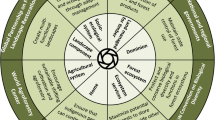Abstract
Interventions to conserve carbon stored in forests are central to the emerging global climate change regime. Widely referred to as REDD+, these interventions engage local resource holders in contracts to restrict their use of land and forests in exchange for conditional benefits, effectively creating a market for forest carbon—a new and intangible commodity. Delving into the social and material implications of this, three case studies (Papua New Guinea, Philippines, Cambodia) examine property relations in the early stages of forest carbon production in different tenure contexts. The case studies reveal that: (a) the risk of local exclusion from forest and lands under REDD+ is real, but is mediated by dynamic negotiations over knowledge and property; (b) the relationship between forest carbon and underlying property relations around land and forests is recursive and mutually constitutive; and (c) due to ongoing and entrenched property contests in REDD+ locations, there remains an unstable foundation for forest carbon markets.
Similar content being viewed by others
Notes
This unit is known as the ‘carbon credit’—a formally certified unit whose purchase allows the buyer to offset or reduce emissions by one metric ton of carbon dioxide (Bumpus and Liverman 2008)
References
Appadurai, A. (1986). Introduction: commodities and the politics of value. In Appadurai, A. (ed.), The Social Life of Things: Commodities in Cultural Perspective. Cambridge University Press, Cambridge, pp. 3–63.
Bumpus, A. G. (2011). The Matter of Carbon: Understanding the Materiality of tCO2e in Carbon Offsets. Antipode. 43(3): 612–638.
Bumpus, A. G., and Liverman, D. M. (2008). Accumulation by Decarbonization and the Governance of Carbon Offsets. Economic Geography. 84(2): 127–155.
Castree, N. (2003). Commodifying What Nature? Progress in Human Geography. 27(3): 273–297.
Cleaver, F. (2002). Reinventing Institutions: Bricolage and the Social Embeddedness of Natural Resource Management. The European Journal of Development Research. 14(2): 11–30.
Filer, C. (2012). Why Green Grabs Don’t Work in Papua New Guinea. Journal of Peasant Studies. 39(2): 599–617.
Ghazoul, J., Butler, R. A., Mateo-Vega, J., and Koh, L. P. (2010). REDD: A reckoning of environment and development implications. Trends in Ecology & Evolution, 25: 396–402.
Hall, D., Hirsch, P., and Li, T. M. (2011). Powers of Exclusion: Land Dilemmas in Southeast Asia. NUS Press, Singapore.
Kosoy, N., and Corbera, E. (2010). Payments for Ecosystem Services as Commodity Fetishism. Ecological Economics 69: 1228–1236.
Larson, A. M. (2011). Forest Tenure Reform in the Age of Climate Change: Lessons for REDD+. Global Environmental Change. 21(2): 540–549.
Peskett, L., and Brockhaus, M. (2009). When REDD+ goes national: A review of realities, opportunities and challenges. In Angelsen, A., Brockhaus, M., Kanninen, M., Sills, E., Sunderlin, W. D., and Wertz-Kanounniko, S. (eds.), Realising REDD+ National Strategy and Policy Options. CIFOR, Bogor, Indonesia.
Phelps, J., Guerrero, M. C., Dalabajan, D. A., Young, B., and Webba, E. L. (2010a). What Makes a “REDD” Country? Global Environmental Change. 20(2): 322–332.
Phelps, J., Webb, E. L. & Agrawal, A. (2010b) Does REDD+ Threaten to Recentralize Forest Governance? Science 328 (16 April 2010): 312–313.
Polanyi, K. (2001 [1944]) The Great Transformation: The Political and Economic Origins of Our Time. Boston, MA, Beacon Press.
Ribot, J., Agrawal, A., and Larson, A. (2006). Recentralising While Decentralizing: How National Governments Reappropriate Forest Resources. World Development. 34(11): 1864–1886.
Ribot, J. C. (1998). Theorizing Access: Forest Profits Along Senegal’s Charcoal Commodity Chain. Development and Change. 29: 307–341.
Sikor, T., Stahl, J., Enters, T., Ribot, J., Singh, N., Sunderlin, W., and Wollenberg, L. (2010). REDD-plus, Forest People’s Rights and Nested Climate Governance. Global Environmental Change. 20(3): 423–425.
Streck, C. (2009). Rights and REDD+: legal and regulatory considerations. In Angelsen, A. (ed.), Realising REDD+: National Strategy and Policy Options. CIFOR, Bogor, pp. 151–162.
Sunderlin, W. D., Larson, A. M., and Cronkleton, P. (2009). Forest tenure rights and REDD+: From inertia to policy solutions. In Angelsen, A., Brockhaus, M., Kanninen, M., Sills, E., Sunderlin, W. D., and Wertz-Kanounniko, S. (eds.), Realising REDD+ National Strategy and Policy Options. CIFOR, Bogor, Indonesia, pp. 139–150.
Tsing, A. L. (2005). Friction: An Ethnograhy of Global Connection. Princeton University Press, Princeton.
Van der Werf, G. R., Morton, D. C., Defries, R. S., Olivier, J. G. J., Kasibhatla, P. S., Jackson, R. B., Collatz, G. J., and Randerson, J. T. (2009). CO2 Emissions from Forest Loss. Nature Geoscience 2: 737–738.
World Bank Institute (2011) Estimating the opportunity costs of REDD+: A training manual. In. Washington DC, The World Bank.
Wunder, S. (2009). Can payments for environmental services reduce deforestation and forest degradation? In Angelsen, A., Brockhaus, M., Kanninen, M., Sills, E., Sunderlin, W. D., and Wertz-Kanounniko, S. (eds.), Realising REDD+ National Strategy and Policy Options. CIFOR, Bogor, Indonesia.
Author information
Authors and Affiliations
Corresponding author
Rights and permissions
About this article
Cite this article
Mahanty, S., Milne, S., Dressler, W. et al. The Social Life of Forest Carbon: Property and Politics in the Production of a New Commodity. Hum Ecol 40, 661–664 (2012). https://doi.org/10.1007/s10745-012-9524-1
Published:
Issue Date:
DOI: https://doi.org/10.1007/s10745-012-9524-1




